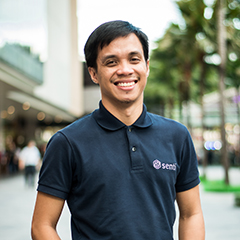Artificial Intelligence Helping Companies With Natural Language Processing
Spreading over 7,000 islands, the Philippines also hosts some 170 different languages. In the early 2000s, researchers tried to muster artificial intelligence (AI) to invent a machine translation system for Filipino languages. Born from those efforts, a young homegrown startup brings artificial intelligence-based systems to help companies make the best of their business.

Ralph Vincent Regalado, CEO and founder of Senti AI, was first a bachelor’s and master’s student in computer science at De La Salle University in Manila, Philippines, before becoming one of its computer science professors. Throughout his studies, he was part of a project working on natural language, and in particular, ways to build machines able to understand the languages used in the Philippines, beyond English, Tagalog, and Cebuano.
Also asked to teach entrepreneurship at the university, the subject piqued his interest. Combining his research and his taste for entrepreneurship, Ralph joined a startup event in Manila and pitched the idea of a localized social listening platform, winning the event’s contest in 2013. “The Philippines is huge in social media and at that time very few tools were able to understand local languages.” Winning the contest “was the start of the [Senti AI] journey,” he said.
Senti at the forefront of Machine Translation

In 2015, Ralph stood at a crossroads and had to choose between a scholarship for a Ph.D. and becoming a full-time entrepreneur. He took a year’s leave to co-found Senti AI with his mentor, and study advisor, Charibeth Cheng. Charibeth started working on AI applications for machine translation with a group of researchers in the early 2000s.
Artificial intelligence is a technology that can augment and help humans to be more efficient with their work, summed up the 33-year-old.
“This is our focus at Senti, to find that balance between humans and AI working together, and responding to common worries, such as AI potentially replacing humans and destroying jobs,” Ralph said. “We advocate putting AI to good use, not only building products, but also taking into consideration how AI will impact organizations, how it will change the workforce, and what are the needs of people in that workforce so that they can work with AI.”
Ralph has also been doing community work and was involved in a Google developer group, becoming a Google developer expert. The group was a way to learn best practices across the globe. Being part of the group “was critical to learn and apply best practices at our level.” Most Senti AI staff, now 32, come from that group of developer experts.
Senti AI, Multi-Award Winning Google Cloud Partner
In August 2021, Senti AI was recognized as a Google Cloud partner with Specialization in Machine Learning workload after it met multiple requirements to achieve the highest technical designation. Some of these requirements include having a certain number of Google-certified professional engineers and publicly-available customer success stories.
The Specialization is also on top of Senti AI being named as Google Cloud Philippines’ (GCP) breakthrough partner in the Philippines — a recognition setting the AI company apart from GCP’s other local partners.
Just this March, the company, represented by Ralph, won first place in the Google Cloud Southeast Asia Partner Pitch World Cup. They had placed second place during the preliminary round held last December 2021.
Senti Pulse – A Social Media Listening Tool
The first product proposed by Senti AI was Senti Pulse, “really a learning journey”. The listening tool provided conversations listening on social media, analyzing what sentiments people were sharing, and providing analytics and insights from those conversations to interested companies. “Clients want to know what people think about their products,” Regalado said.

Senti Pulse can currently understand English, Tagalog and Taglish.
Senti Pulse however did not really meet the needs of the market. A start-up grant from the Philippines’ Department of Science and Technology allowed the young company to expand to a more flexible offer, still based on natural language processing, and the knowledge-base and model of Senti Pulse.
AI Chat Assistant with human-like capability in natural language
Senti AI now proposes Senti Natter, its AI-powered chat assistant, and Senti Voix, its voiced-based counterpart.
Like Pulse, Voix and Natter can also understand English, Tagalog and Taglish (a mix of English and Tagalog).

Other interfaces can also be tailored to a specific market. Clients reach out to Senti AI for innovations in natural language processing. “They have their own data but they don’t have the capability to build machine learning models,” Ralph said.
For example, Senti AI worked with the Department of Health to build a knowledge base to help them communicate guidelines regarding Covid-19 through chatbot assistance.

Other clients include transportation, travel, insurance companies, and finance companies. Senti AI also provides AI consulting strategy for those unsure about which AI-specific technology can be used in their business.
Guaranteeing Data Privacy in AI-Powered Customer Service
The fuel of artificial intelligence is data and Senti AI works with research groups and organizations to help continuously capture more data to improve models. The company follows the process of the National Privacy Commission of the Philippines, and universities’ data capture guidelines.
When working with companies, Senti AI enters into discussion with data privacy officers and cyber security staff to determine which data they can share and help them map out their limitations, in a consultative way. Those limitations can however hinder the interpretation and insights quality.
Intellectual Property – Key for Senti’s Business Expansion
Senti AI uses trademark and copyright for some of its services but is looking at other means of protection, such as software patents where they are available.
Senti does not yet have clients outside of the Philippines, as the Covid-19 crisis put a halt to early discussions. However, those discussions are slowly being rekindled with potential clients in the Southeast Asian region.
“In the next 5 years we are seeing ourselves as the leaders of AI not only in the Philippines but in Southeast Asia,” Regalado said, highlighting the importance of the Specialization in Machine Learning Services recognition they received from Google Cloud. “We would like to continuously innovate in terms of AI and remain on the forefront of that innovation.”
Source: WIPO

 Client Focus
Client Focus